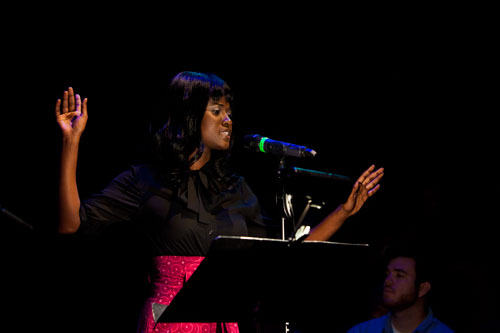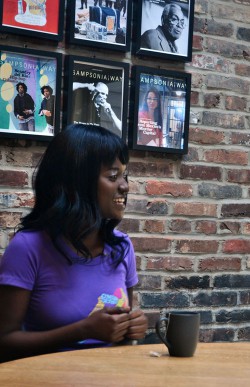“Poetry is always spoken”: An interview with TJ Dema
by Joshua Barnes / September 26, 2012 / 1 Comment
Answer that question. Why do you do this?
I feel compelled to write. There are times when I feel like if I don’t say what I want to say out loud, if I don’t write it down so that I can control what it is I’m saying, and how I’m saying it, and make sure that I’m bringing across the meaning, I feel like I will implode. It is a physical, tangible tension. It affects my mood and my relationships if I deny myself writing, which I did for a while because I had a job that required me to work weekends and odd hours.
Eventually I got to a point where I said “I have a legitimate excuse now for why I don’t write. This life is crazy. I’m never going to make any money at writing. I need to have babies at some point and they need to live in some kind of home. I’ve got these responsibilities to myself and to my poor mother who’s like, ‘My first born daughter is still not married and she doesn’t have kids!'” It got to where I could barely recognize myself because I was frustrated and angry and always wanting to point at something else as being the cause for that frustration, when it was really me. I wasn’t telling my story and this is what I am here for—this is the only thing I know with certainty about myself: I am meant to write and tell stories.
- Blogs TJ Recommends
- • Thoughtsfrombotswana.blogspot.com
- • Bookslive.co.za
- • MsAfropolitan.com
- • Bokamoso leadership forum
Would you say that it is impossible to make it as a full time writer in Botswana?
Yes. I think there are four of us, and two of us live outside the city because that helps a little bit. But it also means that, in a country without a proper infrastructure, it takes four to ten hours to get to the city where all the publishers are. If you are a poet and your first platform is the stage that’s even worse because you need to be in the city center. Otherwise it’s going to be somebody else getting that opportunity to read and share their work. Impossible is a good word. At the moment it’s really difficult and we all do other things: Edit for textbook publishers, manage other artists (which is part of what I do with Sauti Arts and Performance Management), and host literary events that you’d like to see happen, which also means you spend a lot of time trying to get funding for those projects. If you’re not careful it loops back into that nine to five world where you aren’t reading as much, writing as much, and can’t travel as much.
“Our culture understands that the poet is immune from censorship.”
Do businesses or the government provide any kind of support?
I get paid to perform for the government or for corporates. I can do this because our culture understands that the poet is immune from censorship. Traditionally poets were the only members of the community, who didn’t have to be of royal blood, who could tell off the chief. He would then have to reward them with a cow or something. It was the poet’s job to lament, to speak on behalf of the people. The poet had a way with language so he could convey the meaning without causing the king to lose face. Interestingly enough, the government has borrowed this traditional mentality. So I’m allowed to say what I want to say as long as I’m respectful, but that’s not a condition from them, it’s just my understanding of our relationship. I’m not going to go up there and cuss; it’s not part of my culture, nor is it part of my vocabulary, so I’m not editing or censoring myself.
There is a Setswana saying, ntwakgolo ke ya molomo, which means “the most honorable battle is that which is fought with the mouth.” Do you think some of the honor is lost when poets are anthologized? Do Batswana poets have to adapt to fight within the “paradox of loss in preservation?“
To my knowledge, traditionally our poetry was a communal concept in every way. The idea of poets as brands concerned with the ownership of ideas, or any part of language—even the idea of poetry as a product—would have been laughed out of the hut you were standing in. Because we are not (yet) a print or book culture we lose a lot of work with the passing on of each artist whose work only truly exists when they are in front of you performing. This is the practical urgency of publication.
Also anthologies are a great way for any poet to start publishing. Anthologies make sense as collective works, placing less pressure on the least experienced, and allow that body of work to serve as an introduction to writing from a particular group—whether by gender, interest, school, country etc. I myself have edited anthologies for print, online, and CD. From an administrator’s point of view they are also easier to finance.
The concern of the “paradox of loss in preservation” is mainly one of form and medium I think. Spoken word or performance poetry by definition brings in an element of aural/oral and visual presence. One might consider taking advantage of the many mediums at our disposal such as placing text alongside audio online, loading a video of a poetry reading, releasing a CD or DVD along with a book. Language is a full-body experience for me. I need to be able to hear (which is why I read out loud to myself like a nutter all the time). I grew up listening to stories, television and books came much later so I’m not surprised that when it comes to words all my senses seem to be in the ear—this is how I test the texture and weight of a word. How else am I to know a word’s cadence or its sensitivity to the rest of the words and the meaning around it?
“I would be lying if I said I think words by themselves without action can change the world.”
What is the African poet’s role in shattering the “donate-a-dollar-a-day image of Africa” that other writing and media has produced?
I would be lying if I said I think language or words by themselves without action can change the world. At the same time, there is a power in the written word, and certainly in the spoken word, to imperceptibly shift the human psyche, if not the body, into some sort of action. Any poet’s role should be to tell their story; that is the only way to influence perception as a poet. If you also decide to champion certain causes, perhaps this makes you an activist in addition to being a poet, no? These preoccupations may be reflected in your writing along with your other obsessions as a poet.
Of course there are those such as Burmese poet Zeyar Lynn who propagate “poetry from the head” and therefore not the heart, who might define a poet’s role differently. I have veered wildly from your question but perhaps that is an answer in itself.
You are a young, but accomplished poet. What do you still have left to do?
I know very few things, amongst them is this: Somewhere between Shakespeare and Seboni, the revered Botswana poet, I have a lot of my own story to tell. There’s lots more wood yet to gather before I can contemplate starting a bonfire.







One Comment on "“Poetry is always spoken”: An interview with TJ Dema"
I teach Creative Writing at Bethel Park High School in the South Hills, and I was wondering if you do any collaboration with local schools, or if you would be willing to speak to students about your creative process and share some writing?
Thanks!
Chelsea Findlay
BPHS English
findlay.chelsea@bphawks.org